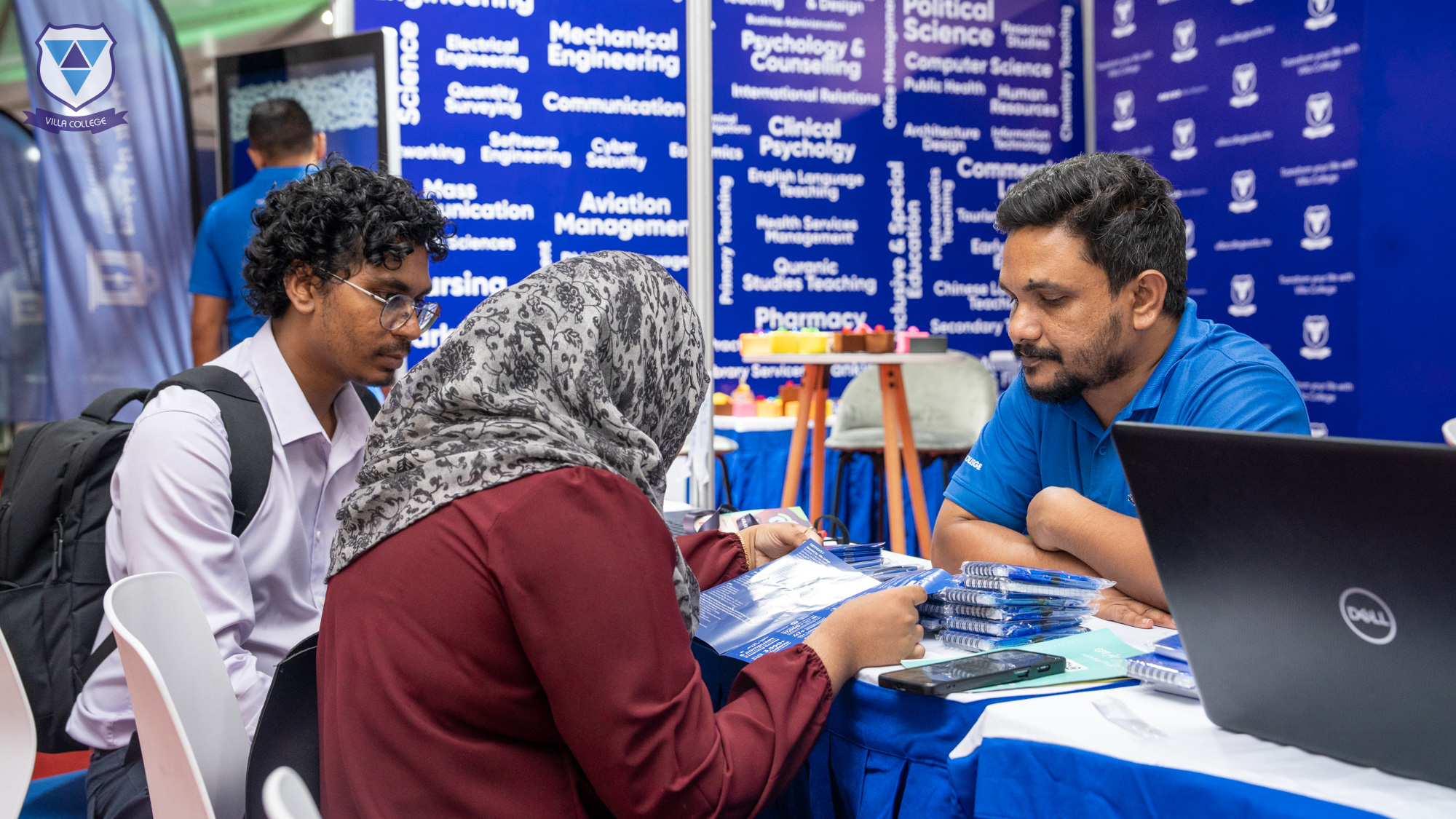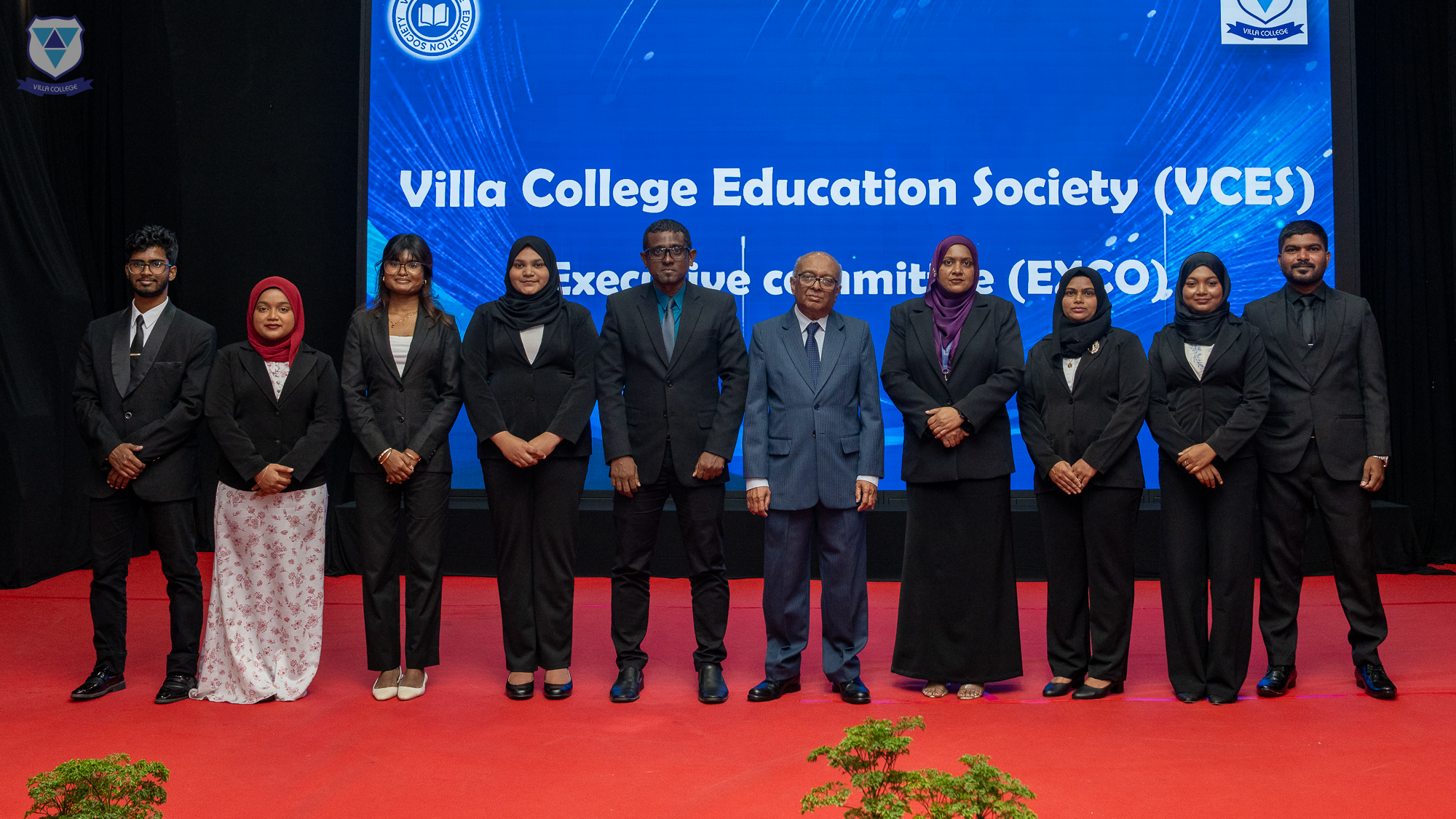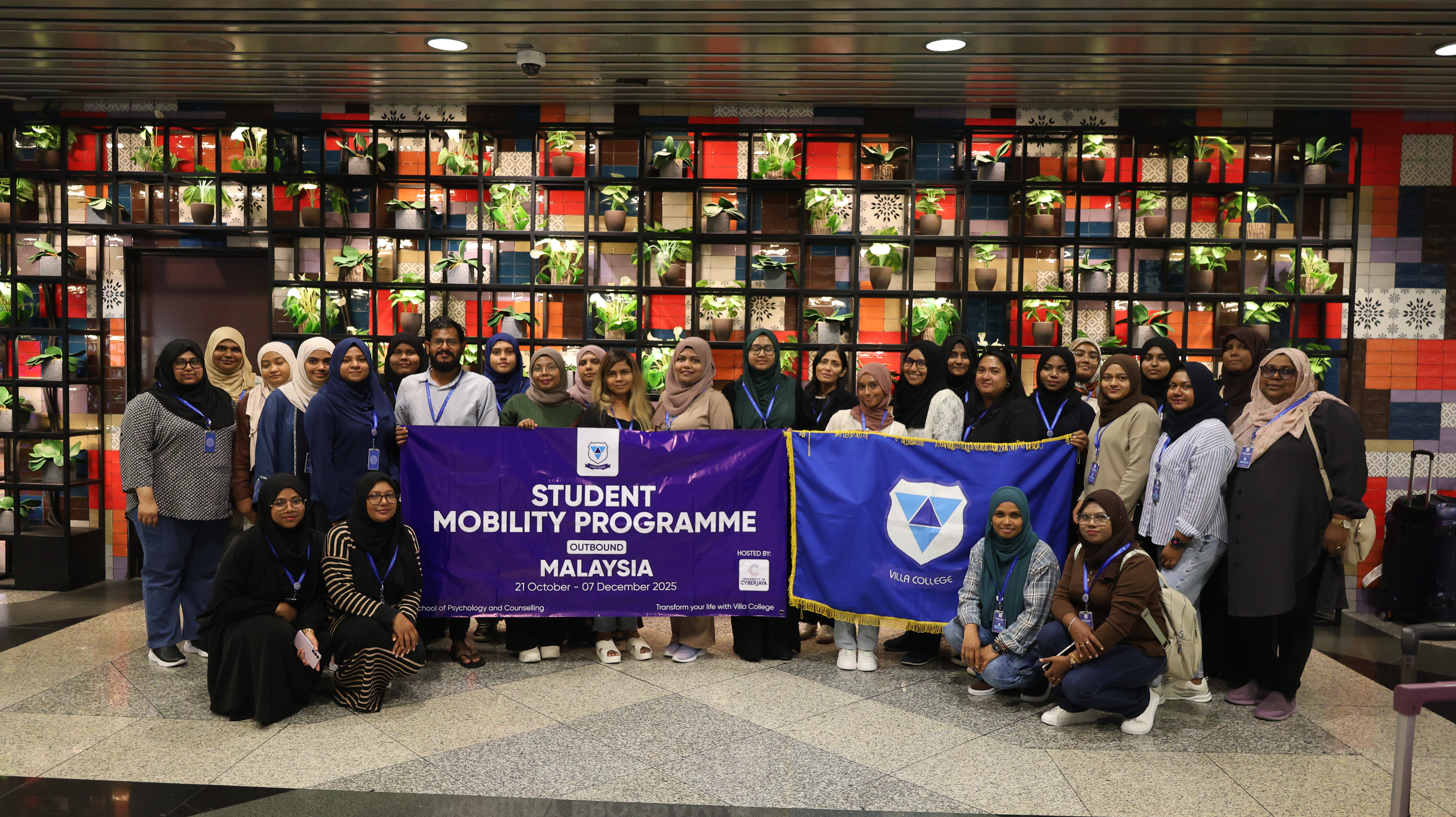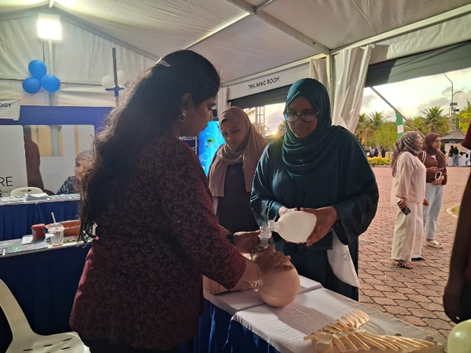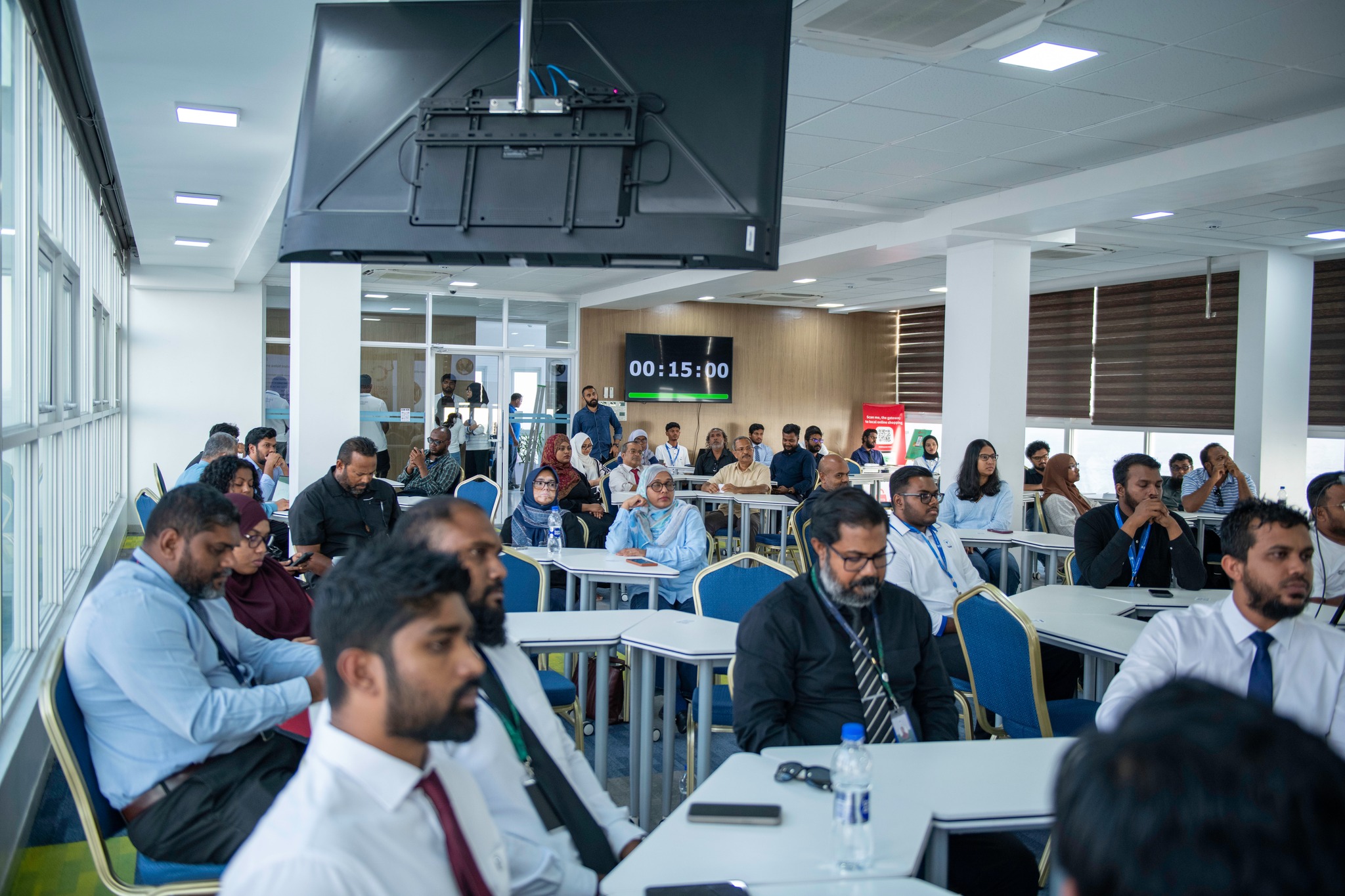
The MOEDT Policy Forum held on 19 November 2025 at Villa College's Ocean View Hall as part of of the Global Entrepreneurship Week celebrations represented a significant convergence of government policy, industry expertise, and entrepreneurial ambition. Organised by Villa College's Centre for Innovation and Entrepreneurship Development in collaboration with the Ministry of Economic Development and Trade, this high-level policy dialogue brought together a diverse array of stakeholders committed to strengthening the Maldives' entrepreneurial landscape. The event demonstrated how strategic partnerships between educational institutions, government bodies, and private sector organisations can create meaningful pathways for entrepreneurial development.
The official opening remarks were delivered by State Minister Hussain Zamir, whose address established the thematic framework for the afternoon's discussions. His remarks underscored the critical importance of creating an enabling policy environment that supports innovation-driven development and sustained entrepreneurial growth. The State Minister reaffirmed the Ministry's commitment to supporting startups, small and medium enterprises, and emerging sectors as vital contributors to national progress, signalling a clear governmental priority towards fostering entrepreneurial activity as a driver of economic diversification.
Following these opening remarks, the forum moved into its first substantive session, led by Legal Officer Germán Cortés. His presentation provided participants with essential insights into the legislative frameworks and policy considerations that govern business operations in the Maldives. This session addressed fundamental questions that many entrepreneurs face when navigating the regulatory landscape, highlighting essential regulatory requirements, compliance obligations, and the evolving policy environment that supports economic diversification. By demystifying the legal aspects of business establishment and operation, this session equipped participants with the knowledge necessary to ensure their ventures operate within appropriate legal parameters whilst taking advantage of supportive policies designed to encourage entrepreneurial activity.
The programme then transitioned to practical implementation with a session on Business Registration Services conducted by MOEDT representatives Yossuf Naseem and Aishath Nahula. This session offered step-by-step guidance on registration procedures, explaining how to effectively utilise ministry support systems and navigate administrative processes. For many aspiring entrepreneurs, the business registration process can appear daunting, representing a significant barrier between concept and implementation. By providing clear, practical guidance on these procedures, this session served to lower these barriers and empower participants to move forward with formalising their business ventures. The hands-on nature of this session proved particularly beneficial for those seeking clarity on the formal requirements of business establishment.
A crucial component of entrepreneurial success extends beyond legal compliance and registration to encompass sound financial management. Recognising this, the forum included a comprehensive Financial Literacy segment facilitated through an engaging discussion led by Ibrahim Shuhail from Maldives Islamic Bank. This session focused on essential financial competencies that often determine the difference between business survival and failure, covering topics such as budgeting, financial planning, and responsible fund management. Participants gained deeper understanding of sound financial practices that are critical for the sustainability and growth of micro, small, and medium enterprises. The emphasis on financial literacy reflected an understanding that technical expertise or innovative ideas alone are insufficient without the financial acumen to manage resources effectively and plan for sustainable growth.
As the programme progressed, attention turned to one of the most transformative forces in contemporary business practice: digital technology and artificial intelligence. The AI Workshop on Digital Skills for Business, conducted by Nageesh Abdullah, equipped participants with practical knowledge on leveraging artificial intelligence and digital tools to enhance productivity, customer engagement, and operational efficiency. This session addressed the reality that digital capability is no longer optional for businesses seeking to remain competitive in an increasingly connected global economy. The focus on digital capability building aligned closely with national priorities to advance technological readiness and innovation capacity among entrepreneurs, recognising that the Maldives' economic future will depend significantly on its ability to embrace and implement digital solutions.
Complementing the AI workshop was a presentation from Fareesha Fathulla of the Maldives Post Office, who introduced participants to the E-Tukuri service. This presentation illustrated how existing infrastructure and services can be leveraged to support entrepreneurial activity, particularly in the realm of e-commerce. Fareesha explained the service's pivotal role in strengthening e-commerce operations through logistics support, digital storefront development, payment facilitation, and expanding nationwide market access for small-scale businesses. For entrepreneurs operating in an archipelagic nation like the Maldives, where geographical dispersion presents unique logistical challenges, services like E-Tukuri can prove transformative in enabling businesses to reach customers across the country and potentially beyond.
The closing remarks, delivered by Dr Damith Gangodawilage, brought the formal proceedings to a thoughtful conclusion. Dr Damith expressed sincere appreciation to the Ministry of Economic Development and Trade, industry partners, presenters, volunteers, and participants for their active engagement and contributions throughout the afternoon. His remarks emphasised the importance of continued collaboration and shared responsibility in building a resilient, innovative, and entrepreneur-friendly ecosystem in the Maldives. He also connected the day's activities to the broader global movement of entrepreneurship, noting that the event aligned with the spirit of Global Entrepreneurship Week, an initiative that unites visionaries from more than 200 nations to spark creativity and advance groundbreaking ideas. This global connection served as a reminder that whilst the Maldives faces unique challenges, it is also part of a worldwide community of entrepreneurs and supporters working towards similar goals.
The formal programme concluded with a networking and refreshments session. The networking session offered participants the opportunity to exchange ideas, form new connections, and explore pathways for future cooperation. These informal interactions often prove as valuable as formal presentations, creating the personal relationships and trust that underpin successful business collaborations and support networks. For many entrepreneurs, particularly those just starting their journey, the connections made during such sessions can provide ongoing support, advice, and partnership opportunities that prove invaluable as they navigate the challenges of business development.
The MOEDT Policy Forum succeeded in delivering a comprehensive and impactful learning experience that combined policy dialogue, practical guidance, and digital literacy development. By bringing together multiple dimensions of entrepreneurial support within a single programme, the event demonstrated how integrated approaches to entrepreneurship development can provide participants with a more complete understanding of the ecosystem in which they operate. The combination of high-level policy perspectives from the State Minister, practical regulatory and registration guidance, financial literacy training, and digital skills development created a holistic learning experience that addressed the multifaceted nature of entrepreneurial success.
The event's success can be measured not only in the quality of content delivered but also in its demonstration of effective collaboration between government institutions, private sector professionals, and educational organisations. Villa College's role as host institution, with the Centre for Innovation and Entrepreneurship Development serving as organising force, illustrated how educational institutions can serve as convening spaces that bring together diverse stakeholders in service of shared goals. The Ministry of Economic Development and Trade's active participation, from the State Minister's opening remarks through the practical sessions on business registration, demonstrated governmental commitment to entrepreneurship that extends beyond policy formulation to active engagement with the entrepreneurial community.
The participation of private sector organisations such as Maldives Islamic Bank and Maldives Post Office further enriched the programme, bringing practical industry perspectives and resources to complement governmental policy frameworks. This tripartite collaboration between education, government, and industry represents the kind of ecosystem thinking that contemporary entrepreneurship development requires. No single sector can create the conditions necessary for entrepreneurial success in isolation; rather, it requires the coordinated efforts of multiple stakeholders, each contributing their unique expertise and resources.
Looking forward, the MOEDT Policy Forum has established a model for how such multi-stakeholder events can effectively contribute to entrepreneurship development. As the Maldives continues to pursue economic diversification and seeks to build a more robust entrepreneurial ecosystem, events like the MOEDT Policy Forum play a crucial role in translating high-level policy commitments into practical support that reaches aspiring and existing entrepreneurs. The forum contributed meaningfully to the continued advancement of the national entrepreneurial ecosystem, demonstrating that with appropriate collaboration, clear focus on practical needs, and commitment from all stakeholders, significant progress can be made in creating the conditions necessary for entrepreneurial success.
The event stands as evidence that Villa College, through its Centre for Innovation and Entrepreneurship Development, is positioned to serve as an effective platform for such collaborations, bringing together the diverse actors whose collective efforts will shape the Maldives' entrepreneurial future.
